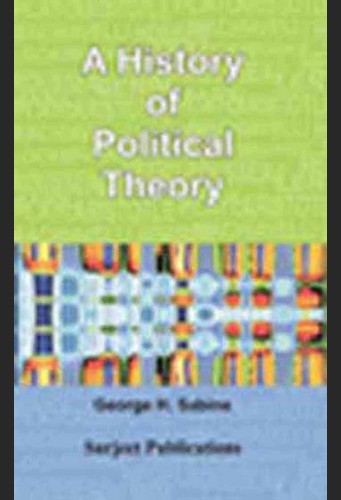A History Of Political Theory By George Sabine Pdf To Word
Unchi Nichi Hai Dagariya (Famous Girl Dance) Wedding Song Remix By Dj Akash Mokama mp3 Quality: Good Download. Unchi nichi hai dagariya song free download full. Licensed to YouTube by SME (on behalf of Sony Music India / 550 Music); Sony ATV Publishing, SOLAR Music Rights Management, UBEM, LatinAutor - SonyATV, SMEIndia_Pub, ASCAP, LatinAutor, and 8 Music.

In this edition as in the preceding the changes are chiefly in the last three chapters; the pagination remains the same down to page 740. Again, however, the bibliographies have been revised throughout and a few new publications have been added to the footnotes. Several minor changes have been made in the text of the chapter on Locke to take some account of the work of Mr.

This standard university textbook on western political theory was first published in 1937, the 2nd and 3rd editions in 1950 and 1961 respectively. The 4th edition in 1973 was under an editor because the author George H. Tekken 5 download for ppsspp windows 7. Sabine had passed away (1880- 1961).
Peter Laslett. Perhaps it would have been better to rewrite the chapter in order to make full use of Mr.
Von Leyden's edition of Locke Essays on the Law of Nature, but this would probably have called for other changes beyond the plan of this revision. Following page 740 the final section of the chapter on Liberalism Modernized has been rewritten in the hope of clarifying its exposition of the assumptions of liberal politics. The chapter on Marx has been pretty completely rewritten, mainly with the purpose of improving the presentation but partly to make the transition to the chapter on Communism clearer.
The exposition of the theory of surplus value has been omitted, partly because it seemed inadequate to the controversy over the theory but chiefly because it seemed that the technicalities of the argument have no important place in the political theory of Marxism. The chapter on Communism has been completely rewritten and recast. For this there were several reasons.
First, the amount of significant publication on the subject in the last ten years has been enormous and it seems possible to give a better account of the history of Leninism than the author could write in 1950. Second, the author was convinced that in the preceding edition he had made too much of the formal inconsistencies between Lenin and Marx. Marxism now seems to him less tightly knit than he then supposed, so that what Lenin got out of Marx was in fact there, even though it was widely different from what Marx had seemed to be to expositors in Western Europe.
In short, there were two Marxian traditions, that which culminated in the socialist parties of the West and that which culminated in Communism. The two traditions were not consistent but they were both in Marx. Third, the author now feels that his account of Communism ran too much in terms of generalities, that he represented Lenin's theory of the party, for example, as if it had merely unfolded the implications of its first statement in 1902. He still believes that the principles were there and that these have indeed remained unchanged.
The fact remains that every application of the principles was a matter of controversy between men who understood the principles perfectly well. The author now thinks his own belief, that political theories develop as part of politics..